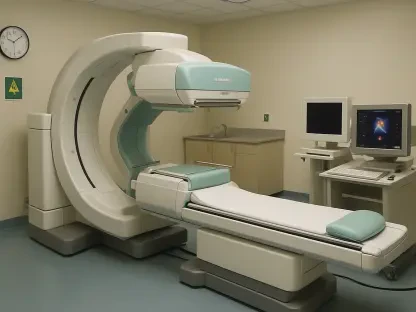The landscape of cardiovascular diagnostics is undergoing significant transformation, spearheaded by groundbreaking technologies like Elucid’s PlaqueIQ. Recently, PlaqueIQ received 510(k) clearance from the Food and Drug Administration (FDA), marking a milestone that promises to enhance how physicians diagnose and manage cardiovascular disease. PlaqueIQ utilizes advanced imaging technology to create detailed 3D models from coronary CT angiography images, offering a profound shift in the analysis and treatment of heart disease.
Technological Advancements in Cardiovascular Diagnostics
Advanced Imaging and 3D Modeling
Elucid’s PlaqueIQ software stands out for its unprecedented ability to convert standard coronary CT angiography images into intricate 3D models, providing a leap forward in examining heart plaque morphology. This technological advancement enables a far more detailed and accurate assessment of heart plaque than traditional imaging techniques ever could. By translating complex imaging data into actionable insights, PlaqueIQ empowers clinicians with a powerful tool that offers a comprehensive understanding of a patient’s cardiovascular health. This transformation not only enhances diagnostic accuracy but also aids in crafting more effective treatment plans tailored to individual patient needs.
Moreover, the 3D modeling aspect of PlaqueIQ brings a visual depth that two-dimensional imaging lacks, facilitating more precise characterizations of plaque deposits. This elevated detail is essential for identifying the composition of the plaque, such as lipid-rich necrotic core or fibrous elements, which are critical factors in evaluating the risk of cardiovascular events like heart attacks or strokes. This feature essentially revolutionizes how medical practitioners approach diagnosing and managing cardiovascular conditions, shifting from a generalized to a highly specific and individualized diagnosis.
Pathologist-Backed Algorithms
One of the standout features that set PlaqueIQ apart from other diagnostic tools is its reliance on pathologist-backed algorithms, which are meticulously built on extensive analysis of microscopic tissue samples. These advanced algorithms enable the software to objectively quantify and classify plaque morphology based on ground-truth histology. This method of diagnosis adds a layer of precision and rigor that is difficult to achieve with traditional techniques, ensuring higher reliability and consistency across different clinical settings.
By integrating pathologists’ insights directly into the software’s framework, PlaqueIQ offers a standardized approach to plaque classification that reduces room for human error. This revolutionary approach means that pathologists’ expert analyses are embedded into the diagnostic process, making PlaqueIQ not just a tool but an extension of expert human judgment. As a result, clinicians can depend on the software to provide consistent and accurate data, thereby enhancing the overall quality of care.
The Significance of Non-invasive Diagnostics
Benefits of Non-invasive Approaches
PlaqueIQ offers a transformative non-invasive solution for quantifying and characterizing non-calcified plaque components, such as the lipid-rich necrotic core. This non-invasive feature is particularly noteworthy because it greatly reduces the necessity for more invasive procedures like catheter-based interventions. Patients benefit immensely from this advancement, as it offers a less risky, discomfort-free alternative for obtaining critical diagnostic information. Physicians, on the other hand, gain access to comprehensive details essential for accurate risk assessment and tailored treatment planning, which can lead to better patient outcomes.
The ability to gather this level of detail non-invasively also opens the door for more frequent monitoring and quicker interventions. Instead of subjecting patients to periodic invasive procedures, clinicians can now track the progression or regression of plaque with ease, ensuring timely adjustments to therapy. This transformation in diagnostic capability signals a shift in patient care paradigms, prioritizing patient comfort and safety without compromising the depth or accuracy of diagnosis.
Implications for Patient Care
Incorporating non-invasive analytics such as those provided by PlaqueIQ has the potential to significantly improve patient care. Early identification of high-risk patients enables physicians to tailor treatments more effectively, possibly averting severe cardiovascular events like heart attacks and strokes. The ability to gather critical data non-invasively also means that patients are more likely to undergo regular screening, contributing to better long-term health outcomes. This proactive approach ensures timely interventions and allows for adjustments in treatment plans based on detailed, precise data.
Additionally, the non-invasive nature of PlaqueIQ makes it a more accessible diagnostic tool, especially for patients who may be apprehensive about undergoing invasive procedures. This accessibility facilitates more comprehensive patient care by removing barriers to regular monitoring and timely treatment. As a result, the non-invasive diagnostic capabilities of PlaqueIQ do not merely enhance individual patient experiences but also contribute to broader public health benefits by making advanced diagnostics more widely accessible.
Clinical and Economic Impact
Enhanced Clinical Decision-Making
The integration of PlaqueIQ into clinical practice is poised to significantly enhance decision-making capabilities among physicians. Detailed data on the vulnerable components of plaque allow physicians to make highly informed choices regarding drug therapies or the necessity of more invasive procedures. This precision enables the avoidance of unnecessary treatments, thereby focusing clinical resources on the most effective interventions for each patient. Comprehensive, data-driven diagnostics such as those offered by PlaqueIQ empower clinicians to provide more personalized and effective patient care.
Accurate and detailed diagnostics are crucial for effective patient management, particularly in the realm of cardiovascular health. By offering a clear and detailed view of plaque morphology, PlaqueIQ helps avoid the pitfalls of generic treatments, allowing for more targeted interventions. This capability not only improves patient outcomes but also boosts confidence in clinical decision-making, ensuring that each step in the treatment process is justified by robust data.
Cost-Saving Potential
Mark Rabbat, a professor at Loyola University Chicago, emphasizes the dual benefits of clinical improvement and economic savings that PlaqueIQ promises. With more precise diagnostics, healthcare systems can reduce the number of unnecessary interventions, leading to substantial cost savings. Additionally, the ability to target treatments more accurately results in improved patient outcomes, thereby minimizing the long-term financial burden of managing chronic cardiovascular conditions. In essence, PlaqueIQ represents a win-win situation for both patients and healthcare providers.
The economic benefits extend beyond direct cost savings from reduced interventions. Accurate diagnostics also mean that treatment plans are less likely to fail, reducing the need for follow-up procedures and additional medical care. This comprehensive approach to patient care fosters long-term health benefits that translate to economic savings for healthcare systems globally. With growing healthcare costs, innovations like PlaqueIQ are essential for creating more sustainable and effective healthcare delivery models.
Trends Towards Data-Driven, Non-invasive Diagnostics
Combining AI and Imaging Technology
PlaqueIQ exemplifies a broader trend in healthcare: the integration of advanced imaging techniques with artificial intelligence (AI). The software leverages the strengths of both technologies, offering a nuanced and accurate picture of a patient’s cardiovascular health. As these technologies continue to evolve, their role in diagnostics is expected to grow even more critical. The combination of AI and imaging enhances the diagnostic process by providing deeper insights and more accurate assessments, setting a new standard in medical diagnostics.
Leveraging AI enables PlaqueIQ to analyze vast amounts of imaging data rapidly and accurately, offering insights that would be difficult, if not impossible, to obtain through manual analysis. This seamless integration results in a more efficient diagnostic process, saving valuable time for both patients and healthcare providers. As technology advances, the capabilities of AI in healthcare will only continue to expand, making tools like PlaqueIQ an indispensable part of modern medical practice.
The Move Towards Precision Medicine
The shift towards personalized, data-driven clinical decisions is increasingly becoming the norm in medical practice. PlaqueIQ’s ability to provide detailed and accurate data on coronary plaque morphology enables clinicians to tailor treatments to individual patient needs. This approach represents a move away from one-size-fits-all medicine towards more precise and effective patient care strategies. Precision medicine ensures that each patient receives the most appropriate treatment based on their unique medical profile, leading to better health outcomes.
Incorporating PlaqueIQ into clinical practice exemplifies this shift towards precision medicine. The software’s detailed insights allow for treatment plans that address the specific characteristics of each patient’s cardiovascular condition. This individualized approach is not only more effective but also enhances patient satisfaction and trust in the medical process. As the medical community continues to embrace precision medicine, tools like PlaqueIQ will play a crucial role in shaping the future of healthcare.
Future Prospects and Ongoing Developments
Beta Testing and Market Launch
Elucid is currently conducting beta testing for PlaqueIQ, with plans to release the software later this year. This phase is crucial for fine-tuning the technology and ensuring it meets clinical needs effectively. The feedback gathered during beta testing will help in making necessary adjustments, thus ensuring that the final product is both reliable and user-friendly. The anticipated market release is expected to be a significant step forward in the widespread adoption of advanced cardiovascular diagnostics.
The beta testing phase also serves as an opportunity for Elucid to collaborate closely with clinicians, gaining insights that will further enhance PlaqueIQ’s capabilities. By involving healthcare professionals in this critical phase, Elucid ensures that the software not only meets but exceeds clinical expectations. This collaborative approach underscores the importance of continuous innovation and adaptation in the rapidly evolving field of medical technology.
Expanding Capabilities
The field of cardiovascular diagnostics is experiencing a major transformation, driven by innovative technologies like Elucid’s PlaqueIQ. This cutting-edge tool recently received 510(k) clearance from the Food and Drug Administration (FDA), a significant milestone that is set to revolutionize the way physicians diagnose and manage cardiovascular diseases. PlaqueIQ leverages advanced imaging techniques to develop highly detailed 3D models from coronary CT angiography images, representing a monumental shift in the analysis and treatment of heart disease.
The ability to visualize coronary plaque in precise detail allows doctors to make more informed decisions about patient care. With PlaqueIQ, clinicians can evaluate the composition, volume, and characteristics of the plaque, which is crucial for identifying patients at higher risk of heart attacks or other cardiac events. This technology not only improves diagnostic accuracy but also enhances the ability to tailor treatments to individual patients, ultimately improving outcomes and reducing the incidence of cardiovascular disease.









